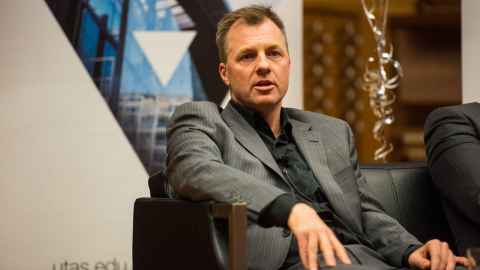We need to talk about America
12 July 2019
America is constantly “fantasised, sensationalised, and caricatured,” says Brendon O’Connor, an expert in American politics at the University of Sydney.

A New Zealander from Gisborne, Associate Professor O’Connor is coming home this weekend to attend an international American studies conference (ANZASA) hosted by the Faculty of Arts at the University of Auckland. He believes it’s a crucial and fascinating time to be talking about America, a country that is often viewed by the rest of the world in highly polarised terms.
“Oscar Wilde said: ‘English people are far more interested in American barbarism than they are in American civilization’. Similarly, George Bernard Shaw, whose quotes are often confused with Wilde’s, ventured that ‘one must distinguish between civilized America and barbarian America,'” he says. “This polarisation suggests that there are at least two Americas, but it misses the bigger point that America, just like other nations, is good, bad and all that is in between.”
Rather than making this simple division, Dr O’Connor is focused on understanding the particularities of the American experience. "And there is no doubt of the incredible reach of American influence and power," he says, "but we shouldn't lose sight of the fact that human nature is, for better and worse, fundamentally the same everywhere."
He believes holding power to account is an honourable tradition and there is much to criticise about American culture, society, politics and foreign relations, but the criticism should be based on evidence.
“And also with a keen sense that while often a leader of many global trends, America is more crucially, part of a world where ideas, products and people circulate widely and in a multi-directional manner.”
He admits no conversation about America these days can avoid Trump and the bitter divisions that seem to have ripped the country apart under his administration; however, these divisions are nothing new.
The current problem is that Trump’s National Security Advisor John
Bolton is more aggressive and arguably more irrational when it comes to
international conflicts than Trump. So it seems like Trump is currently
moderating Bolton!
“Yes, America is divided, but it has often been. In the War for Independence, during the Civil War, during the 1960s and 1970s anti-Vietnam period and during the Civil Right movement, for example. There’s no doubt the ‘American Empire’ is declining and many of the reasons are self-inflicted; a dysfunctional political system, run down infrastructure, extreme inequality, populist politics, lack of knowledge and often a lack interest in the rest of the world.”
As for Trump, he believes we’re right to be scared about what could happen on his watch, but that fortunately up to now, his advisers have curtailed some of his worst and most dangerous ideas.
“The current problem is that Trump’s National Security Advisor John Bolton is more aggressive and arguably more irrational when it comes to international conflicts than Trump. So it seems like Trump is currently moderating Bolton!” Does he think anyone can beat Trump in 2020?
“There is a good chance Trump will be a one term president, yet despite his policies and character, the president could well be re-elected. As Hillary Clinton discovered, running against Trump has its challenges.
"His attack-based, fear-mongering style is more electorally effective than many would hope. Biden, Warren, Sanders, Harris and Buttigieg could all possibly beat Trump.” And some good things are happening in the lead up to the 2020 Democratic Party primaries, he believes.
“The fact that there are big public debates about a ‘Green New Deal’, universal health care, inequality, minority rights, and ethical foreign policy going on in the US at the moment; these are debates that have largely been absent in the past, so the level of discussion of these issues now is a hopeful sign.”
At the ANZASA conference (14 to 16 July), where he will be joining international experts in American history, politics, and culture, Dr O'Connor is looking forward to discussing his ideas on the relationship between political populism and popular culture.
He is a regular media commentator and editor of seven books on anti-Americanism and has also published widely on American welfare policy, presidential politics, US foreign policy, and Australian-American relations.
Media queries
Julianne Evans | Media adviser
Mob: 027 562 5868
Email: julianne.evans@auckland.ac.nz